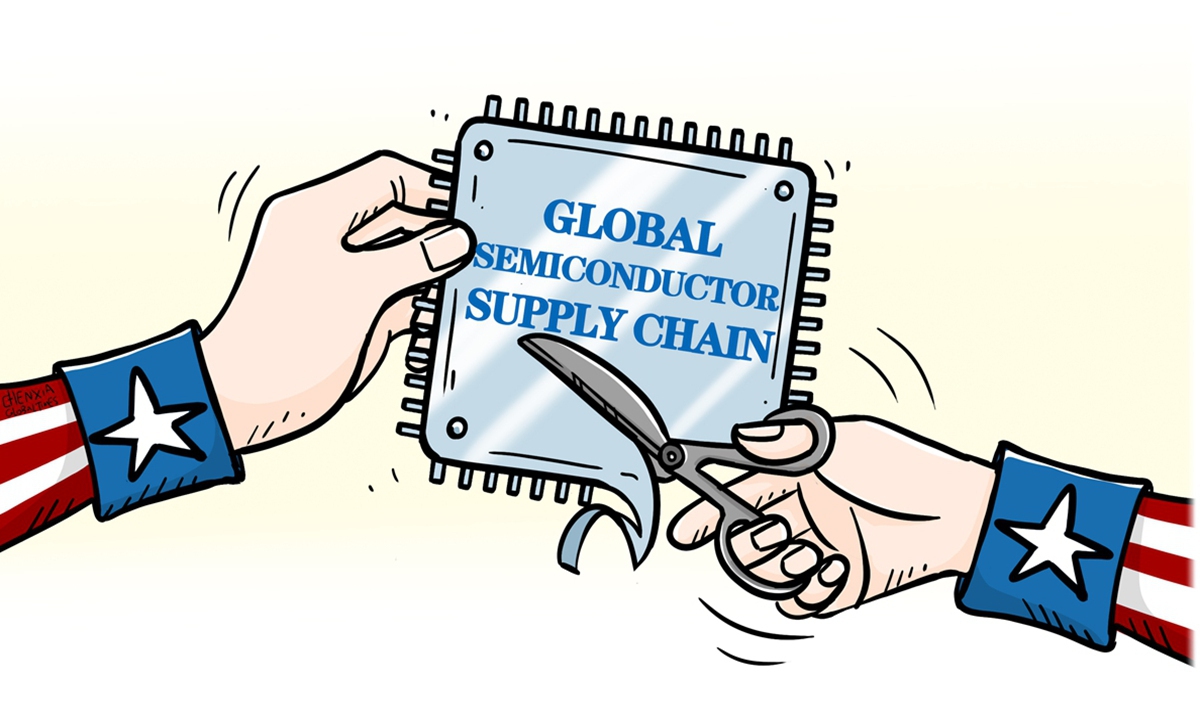Blocking of ASML exports to China opposed, latest US crackdown to have ‘limited effect’
Latest US move to crack down on Chinese technology sector to have limited effect: analysts

chip Photo:VCG
A recent move by the US to push the Netherlands to put fresh limitations on chipmaking machine exports to China was strongly opposed by China. Chinese experts said on Tuesday that the latest curb is more of a probing nature than one causing actual harm, as China has consolidated its position to face off the technology containment by the US.
The comments came after Netherlands-based chip machine giant ASML on Monday said that the Dutch government had partially revoked an export license for the shipment of some chipmaking equipment to China, following US export restrictions.
Exports of NXT:2050i and NXT:2100i lithography systems in 2023 are affected, the company said, adding that it does not expect the situation to have a material impact on its financial outlook for 2023.
The US Department of Commerce announced in December that its Bureau of Industry and Security would launch in January a survey on the use and sourcing of China manufactured current-generation and mature-node semiconductors, also known as legacy chips, in US supply chains.
However, Chinese experts said such a move is more like a show to mollify anti-China elements in the US and that China has passed the point at which it could be choked by a US-led technology crackdown.
In response to the Dutch government's blocking of ASML exports to China, Chinese Foreign Ministry spokesperson Wang Wenbin on Tuesday said that China strongly opposes US' hegemonic and bullying practices that seriously violate international trade rules, undermine the global semiconductor industry structure, and impact the security and stability of the international industrial and supply chains.
Wang urged the Dutch side to respect the spirit of contract and take concrete actions to protect the shared interests of China and the Netherlands and the companies of the two countries, adding that China will resolutely safeguard its legitimate its rights and interests.
"Semiconductor is a highly globalized industry. In a deeply integrated world economy, the US actions will surely boomerang," Wang said.
Xiang Ligang, a veteran telecom industry observer, told the Global Times on Tuesday that the curb does not come as a surprise, as the US has been trying to disrupt China's development pace in semiconductors by constantly hitting the industry with crackdowns.
However, the US knows that such tactics won't be able to strangle China's development, and it's mostly a performance, Xiang said, noting that such tricks won't be the last as the US implements its strategy to crack down on China in the technology sphere.
Ma Jihua, a veteran telecom observer, told the Global Times on Tuesday that the US containment strategy related to high-end chips has failed to prevent Chinese companies from making their own 5G models.
In the Chinese President Xi Jinping's 2024 New Year message, it was noted that "products designed and made in China, especially trendy brands, are highly popular with consumers. The latest models of Chinese-made mobile phones are an instant market success," according to the Xinhua News Agency.
The long chain of the US-led containment strategy, in which the US treats its allies as expendable and puts them at the forefront, has so far failed to work as intended, Ma noted. "To Washington's dismay, the country is now finding that China's advances in mature chips are making many US companies more reliant on Chinese suppliers than before."
Chinese experts said that if the US wants to further expand its scale of technological crackdowns on China, and extend its bans to the making of mature chips, it will have a devastating effect on global semiconductor companies including US chip firms and will only serve as a catalyst for China's homegrown chipmaking industry and supply chains to develop faster.
As the global semiconductor market recovers from a slump, experts said that Chinese foundries stand a good chance of gaining market share after several years of capacity building amid deliberate US crackdowns, which is an unintended result that will baffle US policymakers.
Xiang said 2025 will be a watershed year in the US tech war against China. He predicted that in 2025 China, with nearly 60 foundries in operation, will become the world's largest chipmaker and export a significant volume of medium- and even high-end chips for global customers, reversing a trend in which it imported a lot of chips.
By 2027, China's share in mature process capacity, which refers specifically to the 28-nanometer and bigger process, is expected to reach 39 percent of global capacity, with room for further growth if equipment procurement proceeds smoothly, according to high-tech industry consulting firm TrendForce.
According to World Semiconductor Trade Statistics, a vigorous upswing in the worldwide semiconductor market could see a 13.1 percent increase from $520 billion in 2023.




